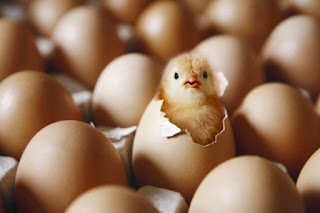Incubation for hatching chicken eggs in the incubator can be a rewarding experience that gets your flock chicken a good start. However, hatching chicken eggs is not always a simple process, and if you want to make sure you get a healthy, prosperous chick, there are some issues you should be aware.
There are two kinds of incubation: natural incubation and artificial incubation. Natural incubation is a brooding by the hen itself while the artificial incubation is hatching and ensure the development of the egg through breeding devices called "incubators". You must harvest as quickly as possible after spawning, the eggs should be placed in incubation within ten days.
The main problem from hatching chicken eggs
Infertility
Unfertilized chicken eggs will not hatch. There could be several causes, including poor housing conditions and power, a lack of roosters or corks that do not recur. If hens are artificially inseminated, it may have been done correctly. An embryo is not visible in a fertile egg. You can discover in mirage, in which you hold a light to the egg.
Hatching chicken eggs occurs rarely in good conditions when the eggs are too small or too large, it is better to choose eggs of 55-60 grams. Therefore the eggs with abnormalities of the shell and abnormal forms are to eliminate. The color of the shells has no influence on the possibility of the outbreak. These eggs must come from hens healthy and well fed.
Inappropriate Temperature
According to the University of Minnesota, if you want to hatching chicken eggs, the temperature in the incubator should be set between 99 and 102 degrees Fahrenheit. If it is too high or too low, it can result in no development of the embryo, embryos died, chicks that hatch the chicks too early or paralyzed. Temperatures too high for a short period of time can lead to results of the chicks die in their shells.
Humidity inappropriate
For hatching chicken eggs, the level of humidity inside the incubator must be between 50 to 55 percent relative humidity, increase up to 65 percent in the last three days of incubation, according to the University of Minnesota. Inappropriate moisture can cause the chicken paste inside its shell, resulting in suffocation. Inappropriate humidity can also cause chicks die in the shells. We must make sure the right humidity in the incubator, or the embryos will die. A lack of growth of vein in the embryo is a sign that the egg has not been developed sufficiently.
This is the video that will show you the general rules for hatching chicken eggs.


